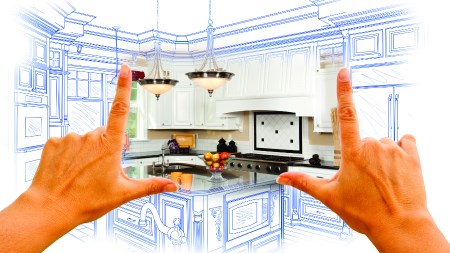One of the best ways to improve the value of your home is to renovate it, but who should you speak to, to make sure that your building dreams don't turn into a construction nightmare?
The importance of consulting a fully qualified and registered architectural professional cannot be underestimated, according to the South African Council for the Architectural Profession (SACAP).
SACAP is legally charged with regulating the architectural profession. Its mandates are provided for in the Architectural Profession Act 2000, (Act No. 44 of 2000) which came into operation in 2001. It upholds the standard of education and training through accrediting Architectural Learning Sites situated within tertiary institutions. It registers suitably qualified candidates and professionals and promotes Continuing Professional Development through collaborative engagement with Voluntary Associations. It protects public interest by identifying the type of architectural work each category of registered person is capable and competent to perform and administrates a Code of Conduct.
While a builder has a full understanding of the mechanics of pulling a structure together, someone who is qualified and has the necessary competencies to become either a fully qualified and registered architectural draught person, technologist, senior technologist or architect, has insights and experience that are vital to the success of your project.
“Possibly the best reason to hire a registered architectural professional is to save you money. This might seem like a contradiction, as their services will cost you. However, take into consideration that such a professional has the skills to create a cost-effective design that meets your brief and even exceeds your expectations, and he has the competency and technology to adapt the plan if need be before shovel is put to the foundation. These might be the difference between a life-long investment or a continued money pit” cautioned Craig Hutchison, CEO of Engel & Völkers Southern Africa.
Any building project that requires foundations to be excavated needs to be approved by your local town council, and architects know all the requirements that need to be met for this.
Part of the architectural professional's job is to create working drawings that give the construction team a step-by-step guide on how to build his/her design, avoiding mistakes during construction that may need to be demolished and rebuilt. A good professional will ensure that you are hundred percent happy with the design before construction begins. While there is always space for minor adjustments, this step is key in avoiding time wastage and extra costs. Architectural professionals also keeps themselves up to date with the latest trends in design, and the latest product developments and building regulations. This means that they know which products are the most appropriate and most cost-effective for a particular project, and it's their business to know about energy-saving construction methods that will save you money in the long-term, long after the workers have left the site.
Registrar/CEO of SACAP Marella O'Reilly says, “This is due to the fact that it is in a registered architectural professional's interest to earn Continuing Professional Development (CPD) points which, amongst other obligations, makes them eligible for continued registration with SACAP. One of the ways they earn CPD points is by attending industry related conferences, seminars, workshops, lecture or by lecturing at an institution, or by becoming a member of a recognised voluntary association.”
It's particularly important in the instance of additions or renovations to an older property that you have an understanding of the design and construction methods that were used when the property was originally built. This is vital to understand any engineering implications that may arise, and to appreciate where the weak points in an old building might be. Your architectural professional has been trained to identify these issues, and he has studied the different construction methods used through the years.
Architectural professionals are not just in the business of designing walls and roofs – they are creative souls who take pride in creating unique environments. They have the training, experience and insights to see the full potential that a space offers, and may come up with great ideas to maximise the value of your property even further. “When the time comes to sell, the buyer who is purchasing a renovated property, can rest assured that additions and alterations done to the property were executed under the supervision of a registered architectural professional – adding more value to the home as they do not run the risk of the property bringing with it more trouble than pleasure” says Craig.
Project management is often included in your architectural professional's fees, which means that they will visit the site frequently to make sure that their design is being correctly executed. They have the knowledge to identify problems that may not be obvious to the untrained eye, and the ability to identify and resolve them as they happen in order to prevent costly accidents at a later stage.
“To be sure that your architectural professional is indeed qualified to perform the tasks for which you are briefing him, check to see that he is registered with SACAP – it is illegal for anyone to practice architecture in South Africa without being registered with this organisation,” advises O'Reilly
“Engel & Völkers sales advisors are also able to assist with putting you in contact with the right experts, or to ensure that the property you purchase is a sound investment” Craig added.
How do architects calculate their fees?
Architectural fees have historically been governed by the Architectural Profession Act 44 of 2000. Part of the Act was a guideline fee structure that is updated annually. The Guideline Professional Fee structure works according to percentages, with different amounts paid at different stages of the construction process. The Guideline Professional Fees structures should be used as a guideline to negotiate with your architectural professional that you are considering appointing. It's worth remembering however, just as you wouldn't negotiate prices with your doctor or your attorney – registered architectural professionals have under-taken serious studies, a structured candidacy internship process under a suitably qualified professional mentor, as well as written practical exams to qualify them to be able to practice their profession, and should therefore be accorded the same respect as other professionals.
In conclusion, ensure that your property is legal by rather using experts as an illegal home could greatly impact your transaction when it comes to the valuation upon sale. “Just as you require experts to keep your building investment safe, you also require experts to keep your financial investment safe, so together with your architectural professional, also keep your property sales advisor's number in your little black book as an expert with good service is definitely worth keeping.





